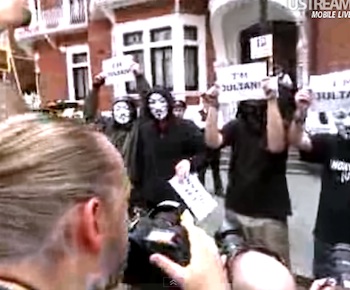As mentioned in SecurityWeek’s coverage yesterday, WikiLeaks founder Julian Assange has gained the asylum he was seeking within the halls of the Ecuadorian embassy, despite the threats and thinly veiled intimidation from the U.K. against his new hosts. But despite this, Assange himself is still trapped, while a war of diplomacy continues.
 On its face, the Ecuadorian government’s granting of asylum to Julian Assange, based on the finding that he has a legitimate fear for his safety should he be handed over to Sweden is a symbolic victory. The reality is that Britain does not intend to let him go, so he remains trapped within the halls of the embassy where he has lived since June.
On its face, the Ecuadorian government’s granting of asylum to Julian Assange, based on the finding that he has a legitimate fear for his safety should he be handed over to Sweden is a symbolic victory. The reality is that Britain does not intend to let him go, so he remains trapped within the halls of the embassy where he has lived since June.
U.K. Foreign Minister William Hague, in statements made to the press, said that the government, “…will not allow Mr. Assange safe passage out of the U.K., nor is there any legal basis for us to do so.”
“The U.K. does not accept the principle of diplomatic asylum. It is far from a universally accepted concept: the United Kingdom is not a party to any legal instruments, which require us to recognize the grant of diplomatic asylum by a foreign embassy in this country. Moreover, it is well established that, even for those countries, which do recognize diplomatic asylum, it should not be used for the purposes of escaping the regular processes of the courts. And in this case that is clearly what is happening.”
[A full copy of his statement to the media is available here.]
The U.K. says that they have a legal obligation to turn Assange over to Sweden, and they have grounds to arrest him based on the bail violations (Assange jumped bail when he went to the embassy to request asylum). They’ve gone so far as to threaten to suspend the diplomatic status of Ecuador in order to enter the embassy and take Assange into custody.
The law they cited in order to prove a point, the Diplomatic and Consular Premises Act 1987, allows the U.K. to revoke diplomatic status in the event that international law is being violated within an embassy’s walls. Essentially, it allows them to act should embassy staff use their status to commit acts of terrorism.
Ecuador said that the U.K.’s mention of the law, and the letter stating that they would use it to arrest Assange – hours before a decision on his asylum request was due – amounted to little more than a threat. Voting 73 to 7, Ecuador’s National Assembly officially condemned and rejected Britain’s threat, and said that if they used they entered the embassy in London without permission, it would constitute an “attack on national sovereignty.”
According to Professor Donald Rothwell, from the Australian National University College of Law, the U.K.’s move is without precedent in modern history, and may very well end up before the international courts.
“…to revoke the diplomatic protection enjoyed by the Ecuadorian Embassy in London is extraordinary and without modern precedent. It highlights how serious the United Kingdom Government is about extraditing Assange to Sweden where he is wanted for questioning over sexual assault,” said Professor Rothwell.
Assange, who has yet to be charged with a crime other than jumping bail, is wanted for questioning in Sweden on sexual assault claims. Questions that the Swedish government refused on many occasions to deliver outside of their jurisdiction, leading most of the public and Assange himself, to firmly believe that the only reason he is to be extradited is so he can be delivered to the U.S. and charged for the 2010 Cablegate leaks.

Almost as if to confirm this, Ecuador’s Foreign Minister Ricardo Patiño said that when he attempted to secure assurances from the Americans, the British and the Swedes that Assange would not be shipped off to the U.S., all of them refused to offer any such assurance. However, in a statement to the Associated Press, the U.S. State Department rejected the notion that the U.S. wanted to prosecute him.
Patiño said they will look for ways to take Assange out of the U.K. that are within international law, but experts say that unless the U.K. agrees, they may have to turn to the International Criminal Court for answers.
Thus, while he has taken the day with regard to his asylum request – the war isn’t over for Assange. In fact, unless the diplomacy works, he will remain in the embassy indefinitely.
As for the U.K.’s threat, most experts say that they won’t carry it out. If anything, Britain won’t carry out their proposed resolution, because they would not be willing to expose their own diplomats and embassy staff abroad to the same level of risk.
For now, as officers from the Metropolitan Police guard the Ecuadorian embassy in London, the matter is purely diplomatic and neither side seems willing to budge.
Related Reading:
Ecuador Says U.K. is Willing to Start International Incident Over Assange















